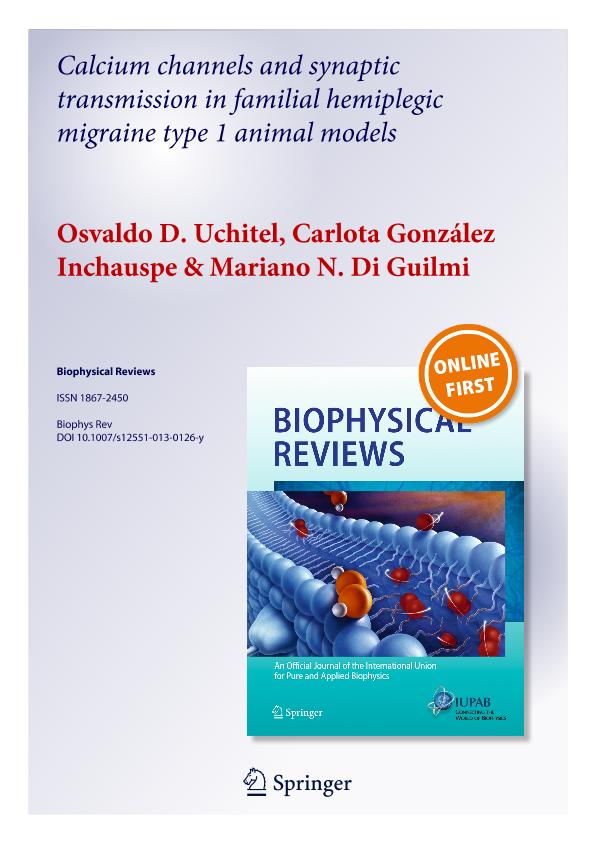Artículo
Calcium channels and synaptic transmission in familial hemiplegic migraine type 1 animal models
Fecha de publicación:
03/2014
Editorial:
Springer Verlag Berlín
Revista:
Biophysical Reviews
ISSN:
1867-2450
e-ISSN:
1867-2469
Idioma:
Inglés
Tipo de recurso:
Artículo publicado
Clasificación temática:
Resumen
One of the outstanding developments in clinical neurology has been the identification of ion channel mutations as the origin of a wide variety of inherited disorders like migraine, epilepsy, and ataxia. The study of several channelopathies has provided crucial insights into the molecular mechanisms, pathogenesis, and therapeutic approaches to complex neurological diseases. This review addresses the mutations underlying familial hemiplegic migraine (FHM) with particular interest in Cav2.1 (i.e., P/Q-type) voltageactivated Ca2+ channel FHM type-1 mutations (FHM1). Transgenic mice harboring the human pathogenic FHM1 mutation R192Q or S218L (KI) have been used as models to study neurotransmission at several central and peripheral synapses. FHM1 KI mice are a powerful tool to explore presynaptic regulation associated with expression of Cav2.1 channels. FHM1 Cav2.1 channels activate at more hyperpolarizing potentials and show an increased open probability. These biophysical alterations may lead to a gain-of-function on synaptic transmission depending upon factors such as action potential waveform and/or Cav2.1 splice variants and auxiliary subunits. Analysis of FHM knock-in mouse models has demonstrated a deficient regulation of the cortical excitation/ inhibition (E/I) balance. The resulting excessive increases in cortical excitation may be the mechanisms that underlie abnormal sensory processing together with an increase in the susceptibility to cortical spreading depression (CSD). Increasing evidence from FHM KI animal studies support the idea that CSD, the underlying mechanism of aura, can activate trigeminal nociception, and thus trigger the headache mechanisms.
Archivos asociados
Licencia
Identificadores
Colecciones
Articulos(IFIBYNE)
Articulos de INST.DE FISIOL., BIOL.MOLECULAR Y NEUROCIENCIAS
Articulos de INST.DE FISIOL., BIOL.MOLECULAR Y NEUROCIENCIAS
Citación
Uchitel, Osvaldo Daniel; González Inchauspe, Carlota María Fabiola; Di Guilmi, Mariano Nicolás; Calcium channels and synaptic transmission in familial hemiplegic migraine type 1 animal models; Springer Verlag Berlín; Biophysical Reviews; 6; 1; 3-2014; 15-26
Compartir
Altmétricas




